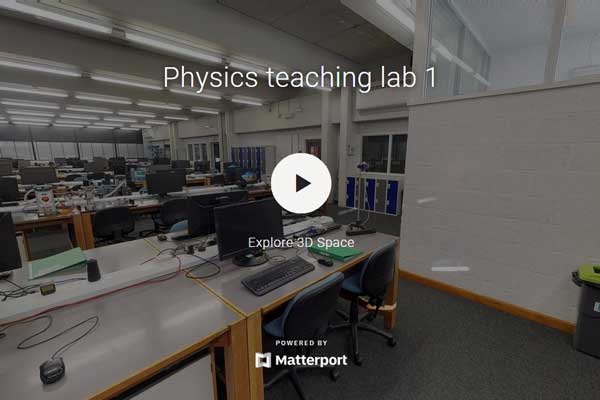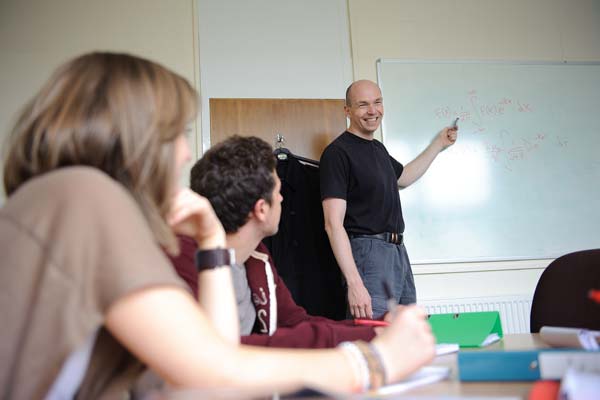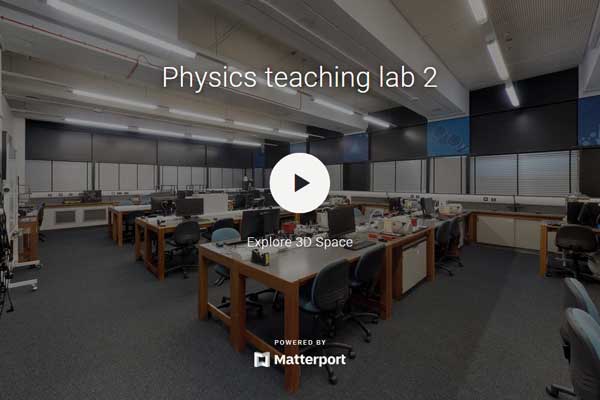View semester dates
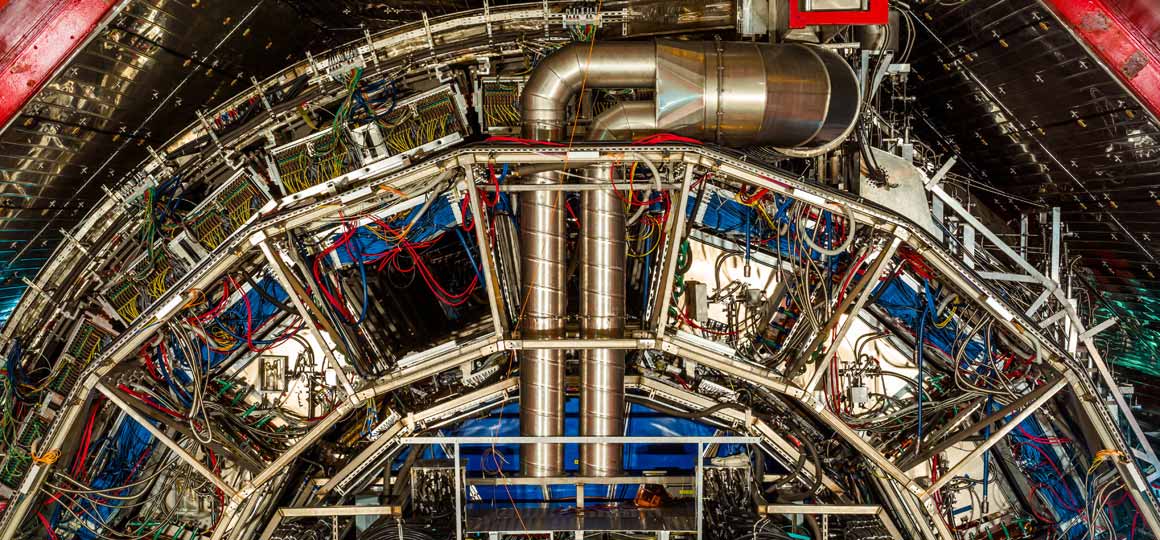
BSc (Hons) Physics (with a year in industry)
Put your knowledge of fundamental forces to work on a prestigious industrial placement.
Year of entry: 2026/27
View semester dates
Physics is the study of the fundamental forces of the universe. Understand the nature of waves and particles, and the structure of matter.
You will gain a thorough grounding in physics, scientific principles and methods. You'll investigate subjects like nanosystems, semiconductors, fusion plasmas, biophysics, and quantum computing.
Learn how to write scientific reports and communicate complex concepts. Understand how to design and perform exciting experiments.
Work with world-renowned physicists with access to unique facilities like our Astrocampus. On graduation, you’ll possess key career skills demanded by employers across a huge range of sectors.
Accreditation
Our Physics courses are accredited by the Institute of Physics, guaranteeing the standard of our teaching and learning. Completing this degree will put you on track to becoming a Chartered Physicist.
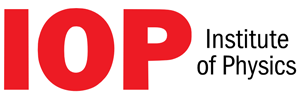
Take a virtual tour of one or our modern, dedicated laboratories showing a typical range of lab equipment and facilities that you'll use.Physics lab virtual tour

I am really enjoying my final year, and my whole degree has been life-changingly wonderful. I cannot imagine anywhere else I would have wanted to study. The people I have met have become the world to me, and the opportunities I have had have been rich in number and quality. Thank you York.
Course content
This course will give you a grounding in fundamental physics and mathematics, alongside a range of advanced topics. Our core and optional modules will give you a broad base of knowledge, and opportunities to focus on the specialist subjects which excite your curiosity.
As you progress you'll hone your lab skills, designing experiments and solving problems. You'll gain experience working with sophisticated equipment and specialist software. You'll spend your third year in industry, putting your skills into practice, and gaining useful experience for your final year and beyond.
In your final year you'll form a team to design and carry out an original research project. You'll work under guidance from an academic supervisor to bring new knowledge and deeper understanding to an area such as quantum mechanics, nuclear physics, nanomaterials or lasers.
Year 1
Year 1 emphasises core material to consolidate your existing knowledge and prepare you for more advanced study. You'll study a range of key modules, and put your learning into practice in the lab throughout the year.
Core modules
- Classical Mechanics and Laboratories
- Classical and Quantum Waves
- Mathematical, Computational and Professional Skills 1
- Electromagnetism and Relativity
- Mathematical, Computational and Professional Skills 2
Option modules
You will study one option module. Examples can be found below. Some option module combinations may not be possible. The options available to you will be confirmed after you begin your course.
Academic integrity module
In addition to the above you will also need to complete our online Academic Integrity module.
Year 2
In Year 2 you'll deepen your understanding of fundamental laws, processes and techniques. Advanced laboratory work will enable you to plan and execute extended experiments. You'll learn to approach problems creatively and develop your skills of experimentation.
Core modules
- Thermodynamics and Electromagnetism
- Mathematics, Professional Skills and Laboratories
- Statistical and Solid State Physics
- Quantum, Atomic, Nuclear and Particle Physics
- Advanced Mechanics, Physics Laboratories and Skills
You will study one option module. Examples can be found below. Some option module combinations may not be possible. The options available to you will be confirmed after you begin your course.
Elective modules
You may be able to replace one option module with an elective module, studying a complementary subject, a language or an interdisciplinary topic.
Year 3
In your third year, you'll undertake a paid placement in industry. This is a chance to apply your physics knowledge, gain valuable work experience, and forge links which could prove useful to your future career.
Our dedicated placement team will help you find and apply for placements. A series of industrial visits and events will assist in your search. In recent years our students have had placements at leading companies and research organisations such as:
- Kromek
- Dyson
- MM Microwave
- BAE Systems
- Jaguar Land Rover
- Airbus
- Selex ES
- Institut Laue Langevin
- Food & Environment Agency
- Science and Technology Facilities Council
- Thales
You will be assigned an industrial supervisor, who is an employee of the company, and an academic supervisor from the School; both will support and monitor your progress through your placement year.
Placements are led by the White Rose Industrial Physics Academy, who promote unique collaborations between York and our leading industrial partners.
You are responsible for securing your chosen placement. If you don't find a placement you will transfer to the standard BSc Physics pathway.
Elective modules
You may be able to replace one option module with an elective module, studying a complementary subject, a language or an interdisciplinary topic.
Before starting a placement that forms part of your course, you are likely to be asked by the placement provider to sign a confidentiality agreement. This is to ensure that you do not disclose any information that is confidential to the placement provider.
Year 4
The final year introduces some advanced concepts, building on the expertise you've developed. Optional modules give you the chance to delve deeper into your favourite topic, or discover a new area of advanced physics.
You'll work on a group project to investigate a current problem in the field. You'll conduct original research to reach new conclusions and, at the highest levels, contribute to our understanding of physics.
Core modules
The BSc Project gives you the chance to design and carry out an extended scientific investigation. You'll join a small group looking at a project which will require creativity and original thinking to tackle. Each project is supervised by a specific member of staff with relevant expertise, who can give advice and assistance.
Recent projects have included:
- Simulation of plasma blobs
- Atomistic modelling of RFeB permanent magnets
- Geant Monte-Carlo simulations for the electrons detection system at ISOLDE(CERN)
- Correlation in systems of interacting electrons
- Probing the structure and dynamics of DNA
- Raman spectroscopy studies of archaeological bone
You'll be supported by a professional skills module, building on the expertise developed in Years 1 and 2. You'll work with a team to develop a talk and academic poster to be given at a conference at the end of the year.
Option modules
You will study four option modules. Examples can be found below. Some option module combinations may not be possible. The options available to you will be confirmed after you begin your course.
- Plasma Physics and Fusion
- Quantum Mechanics
- Advanced Theoretical Techniques and Modelling Matter
- Stars and Galaxies
- Condensed Matter Physics: Electrons in Solids
- Relativity and Cosmology
- Medical Physics
- Nuclear and Particle
- Quantum Science and Technologies
- Astrobiology
- Mobile Communications and Internet Protocols
- Advanced Sensors and Instrumentation
- Scientific Supercomputing
Elective modules
You may be able to replace one option module with an elective module, studying a complementary subject, a language or an interdisciplinary topic.
Our modules may change to reflect the latest academic thinking and expertise of our staff, and in line with Department/School academic planning.
Learning outcomes
Every course at York has been designed to provide clear and ambitious learning outcomes. These learning outcomes give you an understanding of what you will be able to do at the end of the course. We develop each course by designing modules that grow your abilities towards the learning outcomes and help you to explain what you can offer to employers. Find out more about our approach to teaching and learning.
Learning outcomes for this course
- Apply the techniques and results of physics and mathematics to independently solve complex problems, using core physics, mathematics and/or computational knowledge.
- Construct and execute a scientific investigation using the principles of physics in investigating a hypothesis, and interpret outcomes.
- Communicate the integration and inter-relation of core physics, present sophisticated concepts and defend outcomes of physical studies succinctly in both written and oral formats to audiences in a logical way.
- Interact and collaborate effectively within groups applying core physics themes and concepts to open-ended problems.
Use appropriate digital technologies in data handling and understand the wider applications of these techniques in quantitative science. - Discriminate between modern experimental and measurement methods and the limitations imposed by assessment of systematic and random errors in the experimental design and execution.
Fees and funding
The fees and funding information here is for students starting in the 2026/27 academic year.
If you take a year abroad or year in industry you'll pay a reduced rate of fees for that year.
Annual tuition fees
| UK (home) | International and EU |
|---|---|
| £9,535 (TBC) | £32,350 |
The UK government has announced its intention to increase tuition fees from £9,535 to £9,790 for the 2026/27 academic year. We expect this to apply to new UK (home) undergraduate students starting their studies in September 2026.
UK (home) or international fees?
The level of fee that you will be asked to pay depends on whether you're classed as a UK (home) or international student. Check your fee status.
Fees for subsequent years
- UK (home) fees may increase within the government fee cap in subsequent academic years. We will notify you of any increase as soon as we can.
- International fees are subject to increase in subsequent years in line with the prevailing Consumer Price Index (CPI) inflation rate (up to a maximum of 10%).
More information
For more information about tuition fees, any reduced fees for study abroad and work placement years, scholarships, tuition fee loans, maintenance loans and living costs see undergraduate fees and funding.
Additional costs
You will need to cover transportation costs to/from any placement during a year in industry as well as living costs while on placement. You should be able to cover the majority of expenses with salary earned during the placement.
You will need to cover transportation costs to/from any placement during a year abroad. You may be eligible for extra loans and/or grants through your student loan provider dependent on your financial background.
Funding
We'll confirm more funding opportunities for students joining us in 2026/27 throughout the year.
- UK government loans
- UK scholarships and bursaries
- International scholarships
- Country-specific funding
- US loans
Masterclass Research Placements
Any student who enters stage 1 of any of our physics degrees having achieved an A* at A level (or equivalent) in Mathematics or Physics and achieves an overall Year Mark of 70 per cent or higher in stage 1 in their first attempt is guaranteed a Masterclass Research Placement.
In addition, a number of Masterclass places will be made available to students who did not qualify based on entry qualification, but who achieve an overall Year Mark of 70 per cent or higher in stage 1 in their first attempt and have demonstrated significant improvement in their abilities during their first year of study.
York, Oxford, Cambridge, Imperial
Just four UK universities are rated Gold for teaching and top ten for research* in the latest national assessment exercises.
* Awarded joint 10th in the Times Higher Education ranking of the Research Excellence Framework 2021.
Teaching and assessment
You’ll study and learn with academics who are active researchers, experts in their field and have a passion for their subjects. Our approach to teaching will provide you with the knowledge, opportunities, and support you need to grow and succeed in a global workplace. Find out more about our approach to teaching and learning.
Teaching format
Much of your teaching will be in the form of lectures based on our cutting-edge research. You will regularly join other students for small group discussions of course material with a tutor. Discussions often range beyond the immediate subject matter to wider implications and issues.
You'll have regular meetings with a personal academic supervisor, who will guide your studies and keep an eye on your academic progress and general welfare.
Timetabled activities
In your first year, you can expect:
| Lectures | 10 hours per week |
|---|---|
| Seminars | 1-5 hours per week |
| Practicals | 2-5 hours per week |
These figures are representative of a typical week. Your contact hours will vary throughout the year due to your module choices, non-compulsory classes, exam periods and changes to scheduled activities.
Outside your timetabled hours, you'll study independently. This may include preparation for classes, follow-up work, wider reading, practice completion of assessment tasks, or revision.
In the UK, full-time students are expected to spend 1,200 hours a year learning. That's about 40 hours of classes and independent study each week during semesters. Everyone learns at a different rate, so the number of hours you spend on independent study will be different to other students on your course.
Teaching location
You'll be based in the School of Physics, Engineering and Technology on Campus West. Most of your teaching will take place in the School, with some classes elsewhere on Campus West.
About our campus
Our beautiful green campus offers a student-friendly setting in which to live and study, within easy reach of the action in the city centre. It's easy to get around - everything is within walking or pedalling distance, or you can use the fast and frequent bus service. Take a campus tour.
Assessment and feedback
You'll be marked on regular problem exercises and laboratory work, coursework and formal report writing throughout the semester. We balance various types of more formal assessment to develop and test your different strengths:
- Examinations
- Extended assignments
- Weekly practice questions
- Formal reports
- Practical laboratory work
- Presentations
- Practical research methods
You'll get prompt, regular feedback to help you develop your skills. Our open door policy means you can always approach your tutors if you want to discuss your work.
The staff’s open door policy is fantastic. If you ever get stuck on any aspect of anything, they are always there to help you.
Careers and skills
Our graduates are sought by employers in a huge range of disciplines. The skills you will learn - analysis, mathematics, problem-solving - are relevant in industries from finance to software development. This is supported by a central careers service, but also within the school through our contacts with industry. Alternatively, many of our graduates progress to postgraduate degrees at York and other leading universities.
We're committed to supporting our students' career development and employability - it's embedded in our core teaching. We organise activities from careers fairs to leadership building exercises to ensure you're prepared to enter the jobs market with a competitive edge.
Companies that York physics graduates have gone on to work for include: BAE Systems, E.ON, De Vere, The Home Office, Jaguar Land Rover, John Lewis, the Science and Technology Council, and Virgin Money.
Career opportunities
Our graduates are working as:
- accelerator physicist
- engineer
- scientist
- financial coordinator
- IT analyst and consultant
- teacher
- electrical engineer
- environmental modeller
- accountant
Transferable skills
- Self-management
- Communication skills
- Team working
- Problem solving
- Creativity and innovation
- IT literacy
- Mathematics
Entry requirements
| Qualification | Typical offer |
|---|---|
| A levels | AAB including Physics and Mathematics. |
| European Baccalaureate | 80% overall, with 85% in Physics and Mathematics |
| International Baccalaureate | 35 points overall, including 5 in Higher Level Mathematics (either Analysis and Approaches or Applications and Interpretations) or 6 in Standard Level Mathematics (Analysis and Approaches), plus 5 in Higher Level Physics. |
| T levels | We are currently not accepting T Levels for this course unless additional A Level (or equivalent qualifications) in Mathematics and Physics have been taken. |
| Scottish Highers / Advanced Highers | Advanced Highers - BB in Physics and Mathematics plus Scottish Highers - BB We may also be able to consider three Advanced Highers or a combination of Highers and Advanced Highers, where an applicant does not meet the grade requirement through Highers alone. Please contact us to discuss your qualifications. |
| International foundation programme | Foundation Certificate from our International Pathway College or an appropriate alternative. |
| Other qualifications | All other qualifications, including Scottish Highers and Irish Leaving Certificates, will be considered individually. If you don't have suitable qualifications in Maths and/or Physics, successfully completing a Foundation Year will guarantee a place on any of our undergraduate degrees: Physics (with a foundation year) (BSc) We welcome applications from mature students and students without standard qualifications. Please contact our admissions team to discuss your specific circumstances. |
| Other international qualifications | Equivalent qualifications from your country |
Alternative offers
Meeting the following additional criteria may qualify you for an alternative offer.
| Criteria | Adjustment |
|---|---|
| Widening participation | BBC including B in Mathematics and Physics This is conditional upon successful completion of the WP programme including the YorJourney module (Black Access Programme, Next Step York) or successful completion of Realising Opportunities More about widening participation. |
| Contextual offer | BBB including Physics and Mathematics. |
| EPQ | If you achieve C or higher in the EPQ, you may be eligible for an alternative offer up to one A level grade (or equivalent) below our typical offer. |
| The York Tutorial Programme | If you successfully complete the York Tutorial Programme, you may be eligible for an alternative offer up to one A level grade (or equivalent) below your offer. |
English language
If English isn't your first language you may need to provide evidence of your English language ability. We accept the following qualifications:
| Qualification | Minimum requirement |
|---|---|
| IELTS (Academic) | 6.5, with a minimum of 6.0 in each component |
| IB English | A score of 4 in English A or 5 in English B (Higher Level or Standard Level) |
| Cambridge CEFR | 176, with a minimum of 169 in each component |
| Oxford ELLT | 7, with a minimum of 6 in each component |
| Oxford Test of English Advanced | 136, with a minimum of 126 in each component |
| Duolingo | Integrated subscores: 120 overall, with a minimum of 105 in each component |
| GCSE/IGCSE/O level English Language (as a first or second language) | Grade C / Grade 4 |
| LanguageCert SELT | B2 with a minimum score of 33/50 in each component |
| LanguageCert Academic | B2 with a minimum score of 33/50 in each component |
| Kaplan Test of English Language | 478 Main Flight score with 444 in each component |
| Skills for English | B2: Merit overall, with Pass with Merit in each component |
| PTE Academic | 61, with a minimum of 55 in each component |
| TOEFL | 87 overall, with a minimum of 21 in each component (taken before January 2026) 4.5 with 5 in Listening and 4.5 in each other component (taken after January 2026) |
| Trinity ISE III | Merit in all components |
| Other English language qualifications | We also accept other English Language qualifications, including various school-leaving certificates. |
For more information see our undergraduate English language requirements.
If you haven't met our English language requirements
You may be eligible for one of our pre-sessional English language courses. These courses will provide you with the level of English needed to meet the conditions of your offer.
The length of course you need to take depends on your current English language test scores and how much you need to improve to reach our English language requirements.
After you've accepted your offer to study at York, we'll confirm which pre-sessional course you should apply to via You@York.
Next steps
Contact us
Get in touch if you have any questions
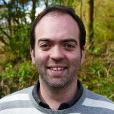
Discover York





